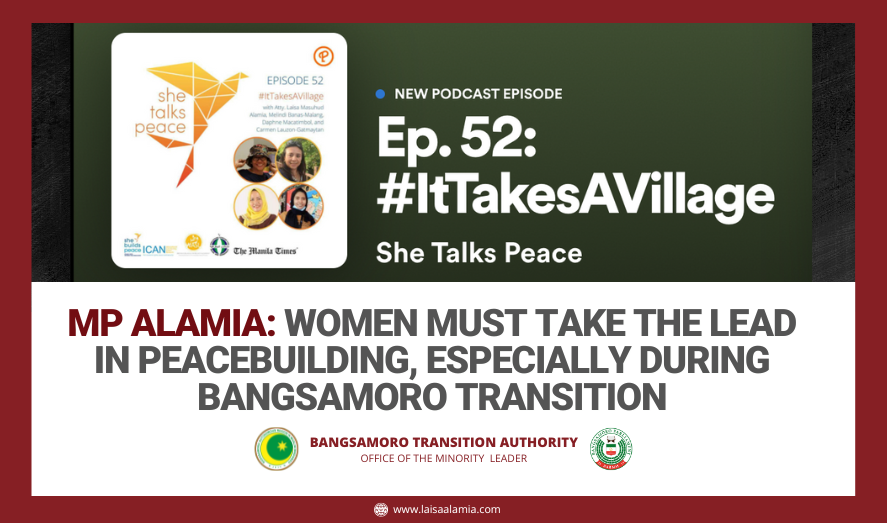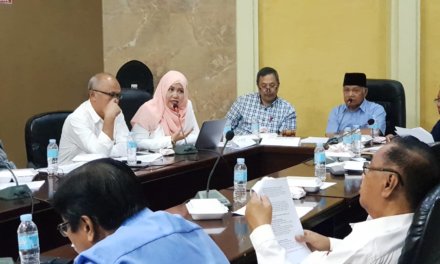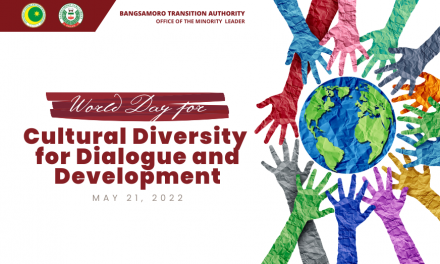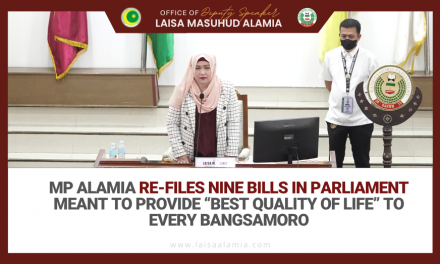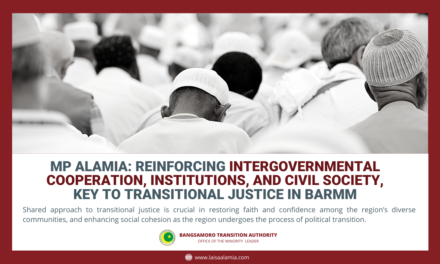MP Atty. Laisa Masuhud Alamia was among the guests in the August 14 epsiode of the podcast She Talks Peace, described as a platform that “highlights the role of women peacebuilders around the world.”
Hosted by Amina Rasul Bernardo, president of the Philippine Center for Islam and Democracy, the podcast focuses on women peacebuilders’ “dreams and hopes for a world without violence, where every woman and girl can be whoever is she wants to be.”
The said episode was also produced for World Humanitarian Day. With a theme that goes back to basics, #itTakesAVillage reminds the public that addressing humanitarian crises requires collective action, but “women and girls are often excluded from decision making processes that shape the response strategies which affect their ability and of their community to recover from crises.”
With MP Alamia were Melindi Banas Malang of the UN Office for the Coordination of Humanitarian Affairs (UN OCHA) and Daphne Macatimbol of the Nonviolent Peaceforce (NP).
Women add value, sustainability to peacebuilding
“Definitely women are making an impact in the Bangsamoro,” MP Alamia said, but she also stressed that this impact comes only from a few women. While many women take part in humanitarian response, “there are only a few women who are actually involved in decision-making and policy-making.”
In her early days of humanitarian work, she said that there were actually only a few women involved in both actual response and decision-making.
She also pointed out how there were only 13 women out of 80 members of the Bangsamoro Parliament, which has resulted in “challenges in pushing for policies for women and children, especially those in conflict-affected areas.”
Malang pointed out how the United Nations has a gender expert in Mindanao to help improve the integration of gender in humanitarian response. “Currently we are looking into the different gaps in coordination, in leadership, even in how we implement the programs,” she said, “to make our gender programming in humanitarian response stronger.”
Women participation in the grassroots still limited
She said that they expect this “conscious undertaking” in the United Nations and the Mindanao Humanitarian Team will eventually translate in the communities they work with, and result in “greater accountability to the affected populations, where the majority of unserved and underserved are women and children.”
Macatimbol agreed that women are “disproportionately represented,” and she cited how having organizations that devised programs specifically targeting women beneficiaries really impacted the response following the siege of Marawi City. “When the organizations provided access to economic opportunities for women, it somehow provided a certain level of ease,” she said.
“When it comes to women’s participation in the grassroots,” Macatimbol noted that “there is a platform for women to participate but not for all women in the community.” Women leaders may have a platform, but “those women in the communities, ordinary women have very limited opportunities.”
MP Alamia shared that “there were cultural and pseudo-religious impediments” to women participation at the grassroots level, but raised the importance of solidarity. She noted how, in her experience, impediments were addressed when they got “champions from the men to support women who would like to be more politically active as leaders of organizations, in groups of barangay health workers, for example.”
Support from Bangsamoro men require multidimensional approach; women leadership indispensable
“There are layers of to the approach in convincing men, especially decision-makers in the communities,” MP Alamia said.
“It’s not just using the law, but also using religion and feminist legal methodologies to make an analysis of particular issues, like harmful practices on the ground in Muslim communities,” she noted, ” and then juxtaposing it with international, national and regional laws.”
“We look at the lived realities of women and children, and appeal to their moral responsibility as men,” she said.
Malang mentioned how there are “a lot of discussions on how to improve the way things are done.” There are a lot of women humanitarian workers at the front line, she said, “and having them there helps us achieve our goals.”
In response, Macatimbol shared how they “capacitate women leaders in the community who are already doing conflict resolution, and those women became champions in their communities as we provided platforms to engage other women, even men.”
MP Alamia agreed with the importance of these channels for solidarity, and shared how work on the National Action Plan for Women, Peace, and Security and its regional counterpart is currently ongoing to improve and expand the plan to ensure its implementation.
Many of the issues that have to be addressed involve “power inequalities,” and women empowerment through resources and agency should be incorporated in the national and regional plans.
“The current political transition and transformation in the Bangsamoro region offer a very unique opportunity to address exclusion in political and civic spaces,” she said, “and we should prioritize the integration of gender-responsive policies into all of our new systems.”

